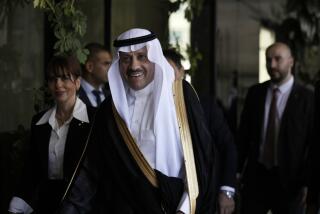Saudis Say They Have Broken Up an Al Qaeda Cell
CAIRO — Saudi Arabia broke up an Al Qaeda terrorist cell that was planning to use explosives and surface-to-air missiles to attack “vital targets” in the desert kingdom, including U.S. warplanes and military personnel, the Saudi government said Tuesday.
The announcement was the latest in a string of events, stretching from Morocco to Pakistan to the United States, suggesting that although Al Qaeda’s refuge in Afghanistan has been destroyed, the appetite and ability of its sympathizers to plan--and in some cases carry out--terrorist acts remain intact.
Saudi security forces were said to be holding seven suspected terrorists--six Saudi citizens and one Sudanese national--charged with smuggling SA-7 surface-to-air missiles into the country. Authorities said that the suspected terrorists tried to fire one rocket near the Prince Sultan Air Base south of the capital, Riyadh, and that they hid another in the desert sands nearby. The U.S. has about 4,500 personnel stationed at the base.
Six other men were arrested on suspicion of helping the Sudanese man slip out of Saudi Arabia.
The first group was planning to “carry out terrorist attacks aimed at vital installations,” according to a statement written by the Interior Ministry and distributed by the official Saudi Press Agency.
Beyond that, the information released by the Saudi government was sketchy. But the announcement marked a watershed for the kingdom--the first time since Sept. 11 that Saudi Arabia has not only arrested some of its own citizens on terrorist charges but declared that they were working with Al Qaeda and Osama bin Laden.
In the wake of the Sept. 11 attacks, the country initially felt that its faith-based system was unfairly tarred because 15 of the 19 hijackers were Saudi nationals.
In the statement Tuesday, the government said the men arrested in Saudi Arabia “are being questioned about their terrorist acts, which go against Islamic principles.”
“It is not surprising that the war with Afghanistan has started this whole new [terrorist] movement,” said Diaa Rashwan, a researcher with the Cairo-based Al Ahram Center for Political and Strategic Studies. “There is going to be a lot of youth now coming up, being active in the name of Islamic jihad.”
Alleged Al Qaeda cases have surfaced in many places around the globe. In the first post-Sept. 11 attack linked to the terrorist network, a bomb-laden truck crashed into a centuries-old synagogue on Djerba, a small Tunisian island off the coast of North Africa, killing 21 people.
Later, Morocco announced the arrest of three Saudis allegedly commanded by Al Qaeda operatives in Afghanistan to blow up U.S. and British ships in the Strait of Gibraltar.
Washington recently accused an American citizen, Jose Padilla, of helping devise a plot to detonate a radioactive bomb in the U.S. And Friday, a car bomb exploded outside the U.S. Consulate in Karachi, Pakistan, killing 12 people.
Whether the successful attacks prove that Al Qaeda is still a major threat--or the arrests prove that it has been weakened as a terrorist force--is a matter of interpretation.
“Al Qaeda was never fully destroyed in the bombing of Afghanistan,” said Hala Moustafa, an Egyptian researcher and expert on Islamic militant groups. “It is expected that Al Qaeda members are becoming active all over the world and especially in Arab countries.”
But Khaled Maeena, editor in chief of the Arab News, based in the Saudi port city of Jidda, said the arrests demonstrate that Al Qaeda is now “a toothless tiger.”
“Al Qaeda has been fragmented,” he said. “It is important that people should know, once the top leadership is in shambles, the foot soldiers will not amount to much.”
But there is also a sense among some observers that a number of the recent arrests, particularly of the so-called dirty bomber in the U.S., have at best been overblown attempts to win public support and divert attention from criticism of Western security organizations.
“With regards to these arrests,” said Rashwan, “this is just an explosion of stories to cover up earlier criticism.”
In the most recent case, Saudi authorities said they had been following the terror suspects for many months. Suspicions heightened in May when security guards found a spent missile launcher tube about two miles from a runway at the desert base.
The Saudi government said that among those arrested was a Sudanese man suspected of being an Al Qaeda cell leader. The man allegedly had slipped out of Saudi Arabia and back into Sudan with the help of five Saudi men and one Iraqi.
The alleged cell leader was picked up by Sudanese authorities and, at Riyadh’s request, was returned to Saudi Arabia.
The Sudanese government announced Sunday that it had returned the suspect to Saudi custody after the man admitted firing a missile at a plane taking off from Prince Sultan Air Base.
Last week, a U.S. official said a Sudanese man suspected of being an Al Qaeda cell leader had acknowledged shooting a shoulder-fired SA-7 missile at a U.S. plane taking off from the base.
At a Pentagon briefing Tuesday, Defense Secretary Donald H. Rumsfeld said that to his knowledge, no important Al Qaeda leaders have been among those arrested by the Saudis and other governments in recent sweeps, but he added that some arrests have probably not been disclosed.
“There are countries arresting people, I am sure, that aren’t even being noted, and that is a continuing process,” Rumsfeld said.
Times staff writer John Hendren in Washington and Jailan Zayan of The Times’ Cairo Bureau contributed to this report.
More to Read
Sign up for Essential California
The most important California stories and recommendations in your inbox every morning.
You may occasionally receive promotional content from the Los Angeles Times.










